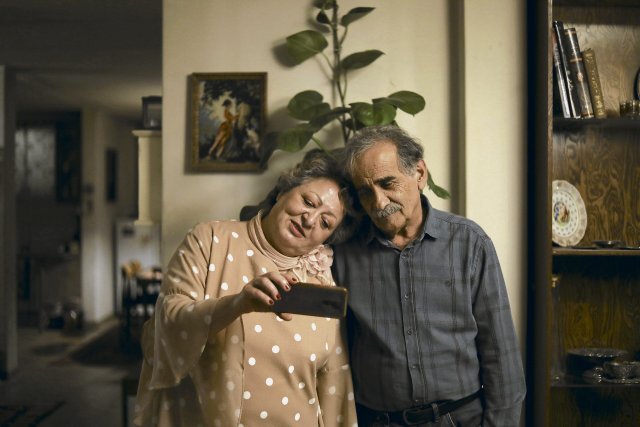The most beautiful film at the Berlinale was a simple, everyday story about the life of a 70-year-old woman in Tehran: “My Favorite Cake” by Maryam Moghaddam and Behtash Sanaeeha.
Photo: Hamid Janipour
“What are the worst things?” Wim Wenders was once asked. He replied: “The bad films!” For some of the films in competition at the 74th Berlinale, you had to agree with the director. It’s torture being bored out of your mind in the cinema and just waiting for the film to finally end. Unfortunately, that was not uncommon this year. And the longer the film, the longer the running time.
It is astonishing how some works were able to end up in the Berlinale competition – for example the weak Italian science fiction story “Another End”, in which the dead are brought back for a short time using a technology that has nothing new to offer and more like a stew made from «A. I.”, “Blade Runner” and “Paris, Texas” works. Or the would-be-intellectual-sounding French lockdown film “Hors du temps” (“Suspended Time”), in which two brothers philosophize about their bourgeois problems during the pandemic.
nd.DieWoche – our weekly newsletter

With our weekly newsletter nd.DieWoche look at the most important topics of the week and read them Highlights our Saturday edition on Friday. Get your free subscription here.
Likewise the Tunisian contribution “Mé el Aïn” (“Who Do I Belong To”), which didn’t have much to say and was therefore filled with dream scenes, long close-up shots and characters who take eternal pauses between words when speaking became. There were a few other supposedly innovative or satirical works that were supposed to be deconstructive or wanted to break the rules of film, but which seemed superficial and artistically clumsy: The story “Pepe” from the Dominican Republic, told from the perspective of a dead hippopotamus (sounds exciting, but it’s not) or the attempted French parody “L’Empire”, in which two alien groups want to conquer the earth and discover sex in the process (a mixture of “Star Wars”, “Dune” and bad ones French summer comedies).
What was even more amazing was that such titles also won awards. One wonders whether the jury, out of desperation, awarded nonsensical films like “Pepe” (Silver Bear for Best Director to Nelson Carlos De Los Santos Arias) or “L’Empire” (Silver Bear, Jury Prize). Or did you want to show that you as a jury have a very special view of things?
In any case, there were stronger titles in the competition. Surprisingly, Matthias Glasner’s three-hour film “Die” with Lars Eidinger in the lead role was not boring at all. Also surprising is that this time it wasn’t Lars Eidinger’s penis in the picture, but rather the genitals of almost all the other male actors. Glasner won the award for best screenplay for “Die”.
The French-German production “Langue Étrangère” by Claire Burger told a stirring and political love story between two teenage girls from Leipzig and Strasbourg who find each other despite different lifestyles. And the Austrian-German film “Des Teufels Bad” by Veronika Franz and Severin Fiala, based on historical events, showed drastic images of the life of a woman in an Austrian village in 1750 who became a murderer due to religious madness. The Austrian cameraman Martin Gschlacht was honored with this film for outstanding artistic achievement.
This year, half of the competition was filled with French co-productions. And in the end – as last year – the Golden Bear was won by a French documentary (in co-production with Senegal and Benin). “Dahomey” by director Mati Diop is about the return of the 26 looted art objects from the former Kingdom of Dahomey from France to what is now Benin.
But the most beautiful film of the festival was not about extraterrestrials, nor was it from the perspective of dead animals or other absurd creatures, nor did it have heavy-handed political messages, nor did it exhibit any symbolic images. The most beautiful film at the Berlinale was a simple, linear story about the life of a 70-year-old widowed woman in Tehran who is trying to find a partner.
“My Favorite Cake,” which premiered in the absence of Iranian directors Maryam Moghaddam and Behtash Sanaeeha, is a heartwarming film that shows a realistic, everyday picture of life and love in Tehran, which has always been the case for decades, since the Islamic Revolution The system was censored so that people, especially abroad, would not hear anything about this everyday life. For example, the image of women who, first of all, take off their headscarves in public when they come home, or the image of men and women dancing and drinking together. That sounds banal, but showing this omnipresent everyday life is very special and also very political.
Iranian directors always had to lie in their films about everyday life in their country. For example, the women had to show women wearing headscarves in their own bedrooms so that they could even send the films abroad. But at least after the women’s uprising in Iran in 2022, these lies no longer work. Maryam Moghaddam and Behtash Sanaeeha chose an uncensored picture and were punished with a ban on leaving the country. The people in power there are so afraid of people’s everyday images.
Prize winners of the Berlinale 2024
- Golden Bear for best film: “Dahomey” by Mati Diop
- Silver Bear, Grand Jury Prize: “Yeohaengjaui pilyo” (“A Traveler’s Needs”) by Hong Sangsoo
- Silver Bear, Jury Prize: “L’Empire” by Bruno Dumont
- Silver Bear for Best Director: Nelson Carlos De Los Santos Arias for “Pepe”
- Silver Bear for Best Acting Performance in a Leading Role: Sebastian Stan in “A Different Man”
- Silver Bear for Best Actress in a Supporting Role: Emily Watson in “Small Things Like These”
- Silver Bear for the best screenplay: Matthias Glasner for “Die”
- Silver Bear for outstanding artistic achievement: cameraman Martin Gschlacht for “Des Teufels Bad”
sbobet sbobet88 judi bola online sbobet
